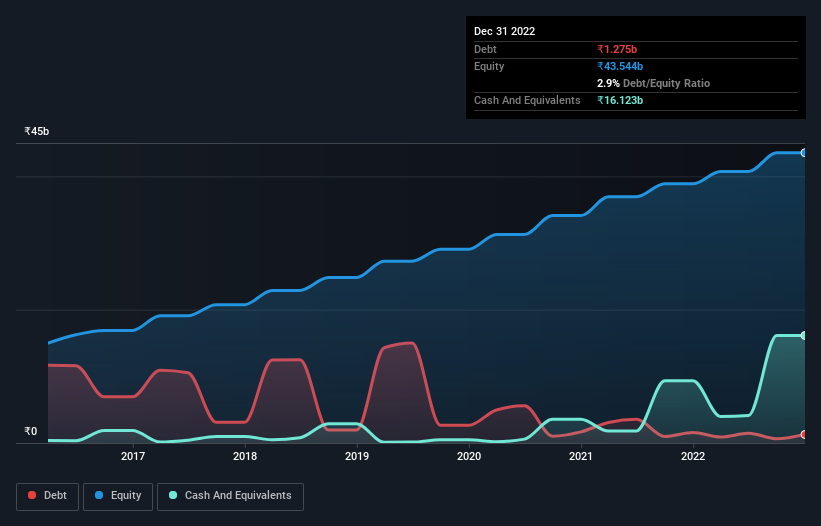
The external fund manager backed by Berkshire Hathaway's Charlie Munger, Li Lu, makes no bones about it when he says 'The biggest investment risk is not the volatility of prices, but whether you will suffer a permanent loss of capital.' It's only natural to consider a company's balance sheet when you examine how risky it is, since debt is often involved when a business collapses. We note that KRBL Limited (NSE:KRBL) does have debt on its balance sheet. But should shareholders be worried about its use of debt?
When Is Debt A Problem?
Debt assists a business until the business has trouble paying it off, either with new capital or with free cash flow. Part and parcel of capitalism is the process of 'creative destruction' where failed businesses are mercilessly liquidated by their bankers. However, a more common (but still painful) scenario is that it has to raise new equity capital at a low price, thus permanently diluting shareholders. Having said that, the most common situation is where a company manages its debt reasonably well - and to its own advantage. The first step when considering a company's debt levels is to consider its cash and debt together.
View our latest analysis for KRBL
How Much Debt Does KRBL Carry?
You can click the graphic below for the historical numbers, but it shows that KRBL had ₹1.28b of debt in September 2022, down from ₹1.58b, one year before. But it also has ₹16.1b in cash to offset that, meaning it has ₹14.8b net cash.

A Look At KRBL's Liabilities
According to the last reported balance sheet, KRBL had liabilities of ₹6.26b due within 12 months, and liabilities of ₹1.86b due beyond 12 months. Offsetting these obligations, it had cash of ₹16.1b as well as receivables valued at ₹2.56b due within 12 months. So it can boast ₹10.6b more liquid assets than total liabilities.
This surplus suggests that KRBL has a conservative balance sheet, and could probably eliminate its debt without much difficulty. Succinctly put, KRBL boasts net cash, so it's fair to say it does not have a heavy debt load!
In addition to that, we're happy to report that KRBL has boosted its EBIT by 39%, thus reducing the spectre of future debt repayments. The balance sheet is clearly the area to focus on when you are analysing debt. But you can't view debt in total isolation; since KRBL will need earnings to service that debt. So if you're keen to discover more about its earnings, it might be worth checking out this graph of its long term earnings trend.
Finally, a company can only pay off debt with cold hard cash, not accounting profits. While KRBL has net cash on its balance sheet, it's still worth taking a look at its ability to convert earnings before interest and tax (EBIT) to free cash flow, to help us understand how quickly it is building (or eroding) that cash balance. During the last three years, KRBL produced sturdy free cash flow equating to 74% of its EBIT, about what we'd expect. This cold hard cash means it can reduce its debt when it wants to.
Summing Up
While we empathize with investors who find debt concerning, you should keep in mind that KRBL has net cash of ₹14.8b, as well as more liquid assets than liabilities. And it impressed us with its EBIT growth of 39% over the last year. So we don't think KRBL's use of debt is risky. Over time, share prices tend to follow earnings per share, so if you're interested in KRBL, you may well want to click here to check an interactive graph of its earnings per share history.
Of course, if you're the type of investor who prefers buying stocks without the burden of debt, then don't hesitate to discover our exclusive list of net cash growth stocks, today.
If you're looking to trade KRBL, open an account with the lowest-cost platform trusted by professionals, Interactive Brokers.
With clients in over 200 countries and territories, and access to 160 markets, IBKR lets you trade stocks, options, futures, forex, bonds and funds from a single integrated account.
Enjoy no hidden fees, no account minimums, and FX conversion rates as low as 0.03%, far better than what most brokers offer.
Sponsored ContentValuation is complex, but we're here to simplify it.
Discover if KRBL might be undervalued or overvalued with our detailed analysis, featuring fair value estimates, potential risks, dividends, insider trades, and its financial condition.
Access Free AnalysisHave feedback on this article? Concerned about the content? Get in touch with us directly. Alternatively, email editorial-team (at) simplywallst.com.
This article by Simply Wall St is general in nature. We provide commentary based on historical data and analyst forecasts only using an unbiased methodology and our articles are not intended to be financial advice. It does not constitute a recommendation to buy or sell any stock, and does not take account of your objectives, or your financial situation. We aim to bring you long-term focused analysis driven by fundamental data. Note that our analysis may not factor in the latest price-sensitive company announcements or qualitative material. Simply Wall St has no position in any stocks mentioned.
About NSEI:KRBL
KRBL
Manufactures and markets rice products in India and internationally.
Flawless balance sheet second-rate dividend payer.
Similar Companies
Market Insights
Community Narratives



